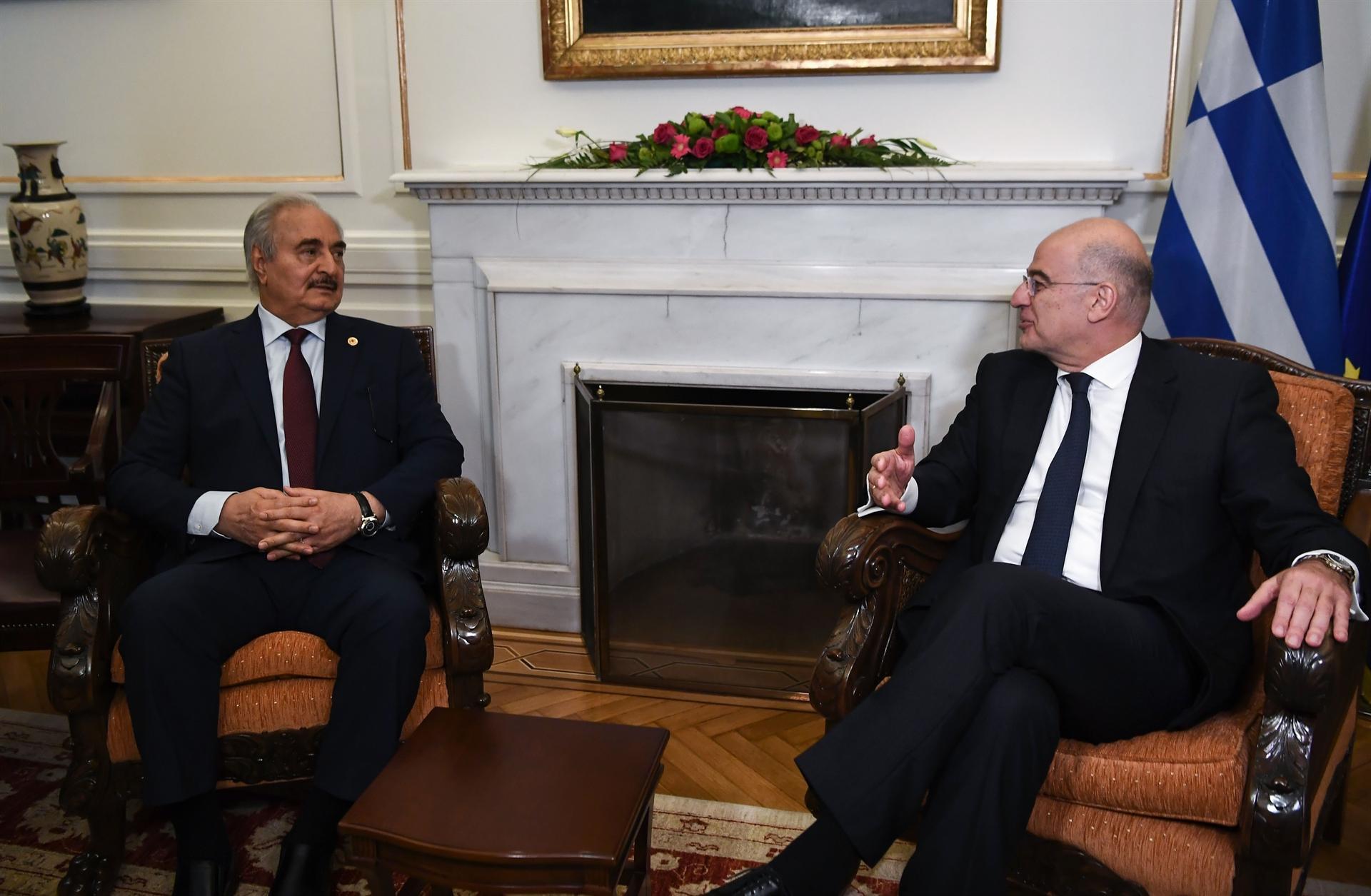
Greek Foreign Minister Nikos Dendias (R) meets with Libyan military commander Khalifa Haftar in Athens, on Jan. 17, 2020, days ahead of a peace conference in Berlin which he and the head of Tripoli's U.N.-recognised government are expected to attend.(AFP Photo)
The commander of forces fighting the U.N.-supported government in war-torn Libya has begun meetings in Athens.
Khalifa Haftar met with Greek Foreign Minister Nikos Dendias after arriving for a previously unannounced visit late on Jan. 16.
He will continue meetings with Prime Minister Kyriakos Mitsotakis on Jan. 17 as well as with other senior Greek officials.
The surprise visit by Haftar takes place ahead of a weekend summit in Berlin aimed at halting the conflict in oil-rich Libya which is being fueled by competing for international support for the warring sides.
Turkey, which has promised to send troops to back Libya's government against Haftar’s offensive, is at odds with Greece over oil-and-gas drilling rights in the East Mediterranean.
Police maintained a heavy security presence outside the hotel next to parliament in central Athens where Haftar is staying.
Meanwhile, Germany on Jan. 16 said that Haftar is committed to a ceasefire.
German Foreign Minister Heiko Maas, after visiting the eastern Libyan city of Benghazi, also said Haftar is willing to attend a conference in Berlin on Jan. 19 about the conflict.
Maas's comment follows efforts by Russia and Turkey to persuade Haftar on a visit to Moscow this week to agree to a lasting ceasefire and halt the offensive on Tripoli. Haftar left Moscow without signing the proposal.
The nine-month-old war over Tripoli is just the latest bout of chaos in Libya, an OPEC member that has become a hub for human traffickers to ship migrants by boats to Italy, while Islamist militants have exploited the widespread disorder.
"If developments in Libya are allowed to continue, then Libya will be the next Syria and we don't want that to happen," Maas said later on German television.
The conference to be hosted by Germany on Jan. 19 would bring together Libyan rival camps and the foreign powers that support them to try to end the war over Tripoli and resume talks on a power-sharing deal.
Among those attending would be Russian President Vladimir Putin, Turkish President Recep Tayyip Erdoğan, U.S. Secretary of State Mike Pompeo and European leaders, Maas said.
"General Haftar has signaled his readiness to contribute to the success of the Libya Conference in Berlin and is willing to participate. He has repeated his commitment to observe the existing ceasefire," Maas said in a tweet sent by his ministry.
German Chancellor Angela Merkel welcomed the move and said the conference aimed to get parties to honor a weapons embargo.
"At the Libya conference we must above all see that the weapons embargo is adhered to again, which is basically agreed by the U.N. but unfortunately not honored," she told reporters.
Maas said on German television that after a ceasefire and arms embargo had been observed, a political process must take place under the auspices of the United Nations to give Libya a prospect of ending its civil war.
Libya's U.N.-recognized Government of National Accord (GNA) on Jan. 16 said forces loyal to Haftar violated the cease-fire in the country.
Muhammed Kununu, the military spokesman of the GNA, said Haftar militias targeted al-Brega oil complex in southern Tripoli.
The oil complex sustained the damage, he added.
Haftar forces targeted the GNA forces in Gasr Garabulli area, 50 kilometers (31 miles) east of Tripoli, an Anadolu Agency correspondent reported.
Libya has been fractured and deeply unstable, with outside powers providing support to rival armed factions since veteran dictator Muammar Gaddafi was toppled in a 2011 uprising.
Turkey backs Fayez al-Sarraj's internationally recognized Government of National Accord (GNA) while Haftar - whose forces control much of Libya's east and south - has received support from Egypt, the United Arab Emirates, Jordan, and Russian mercenaries.
Turkey is beginning to send troops into Libya in support of Sarraj's government, Erdoğan said on Jan. 16.
Turkey to keep backing legitimate Libyan gov’t: Turkish president

"In order for the legitimate government in Libya to remain standing and for stability to be established, we are now sending our soldiers to this country," Erdoğan told an event in Ankara.